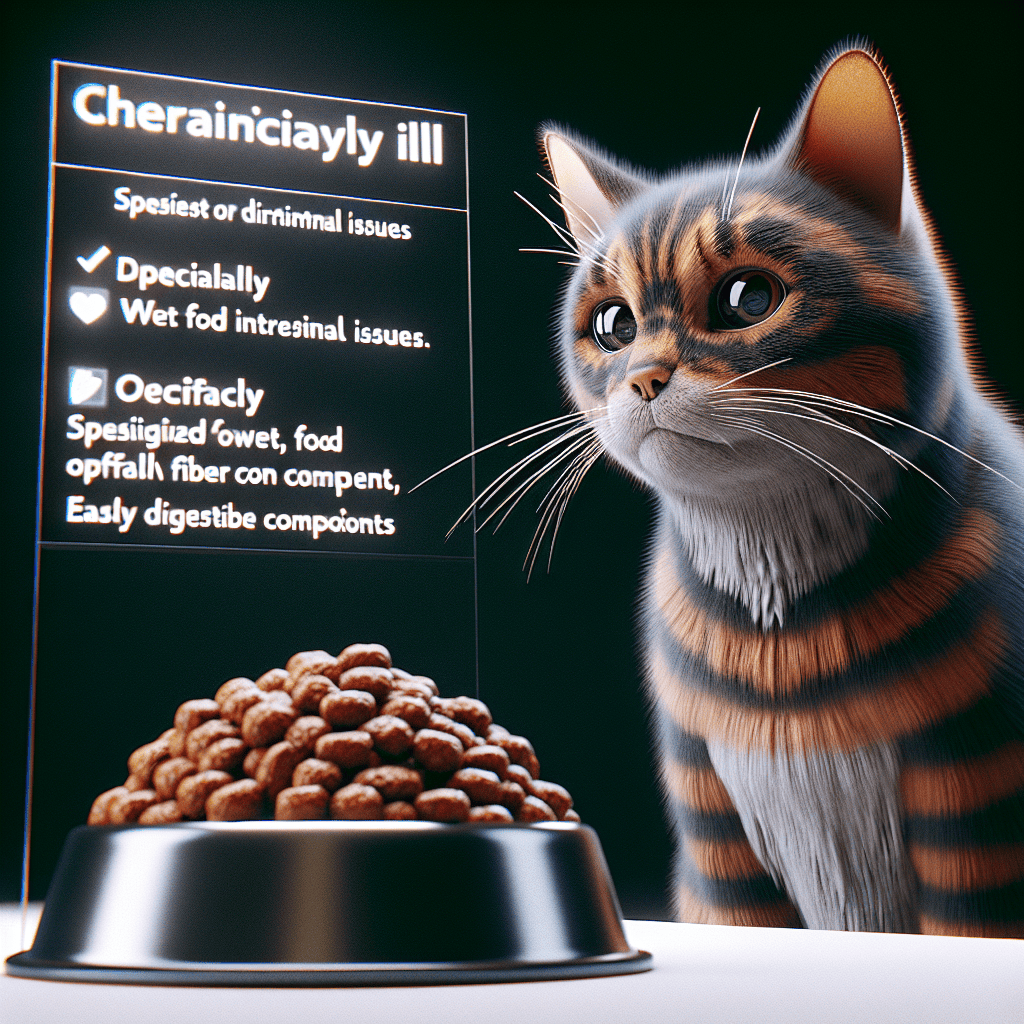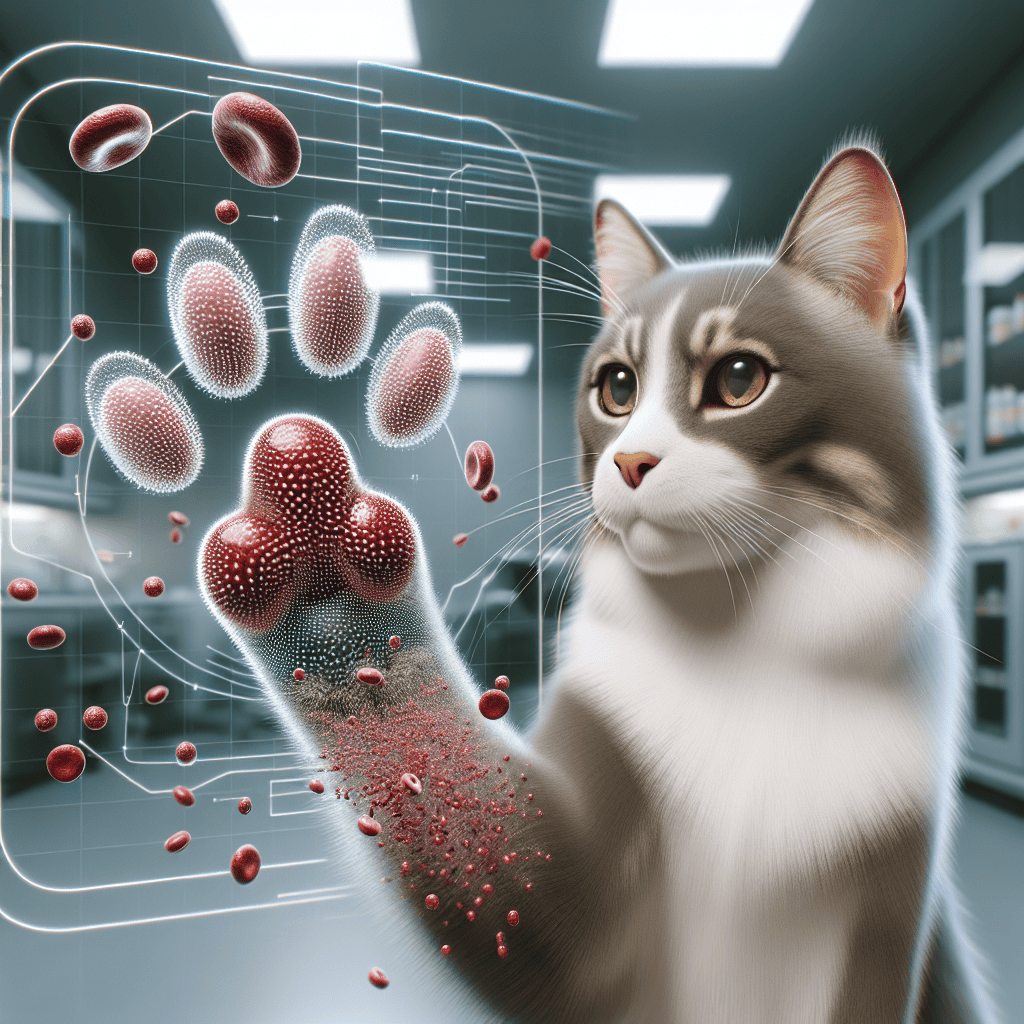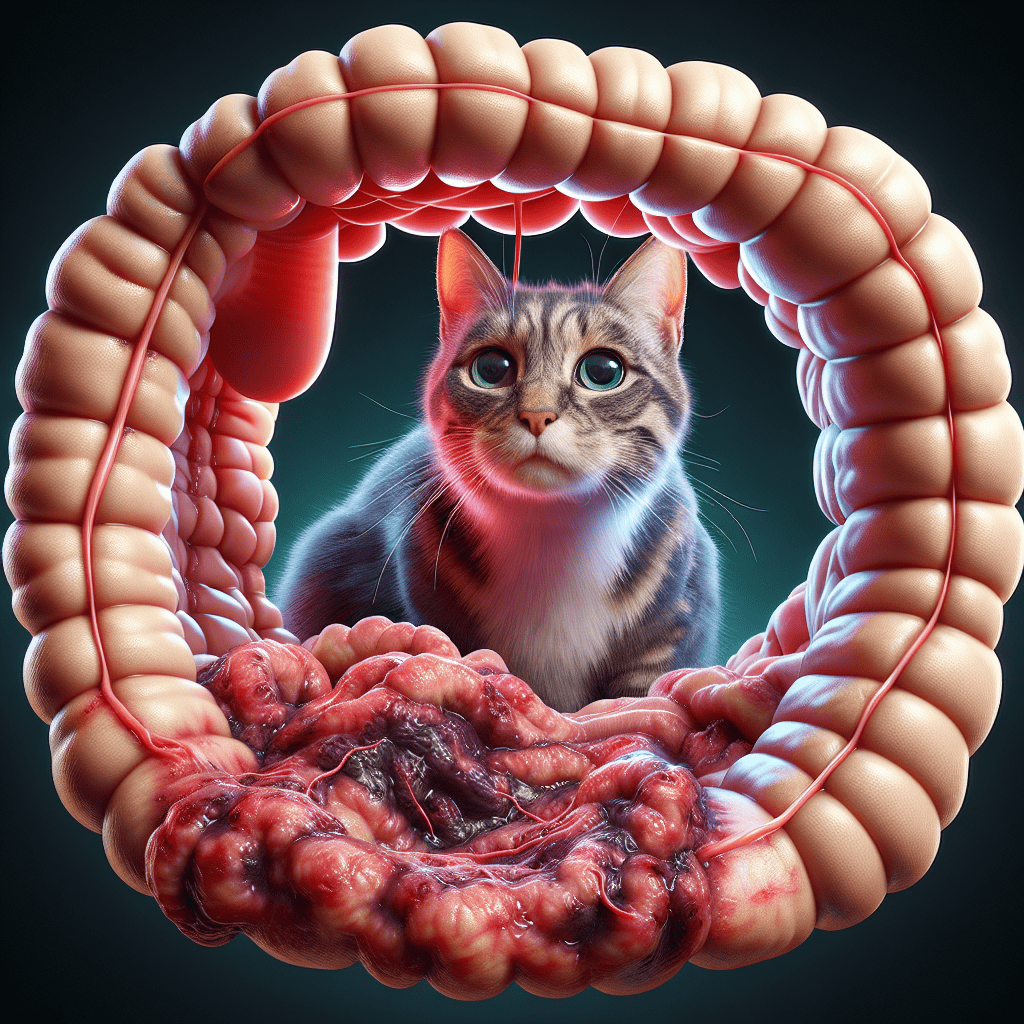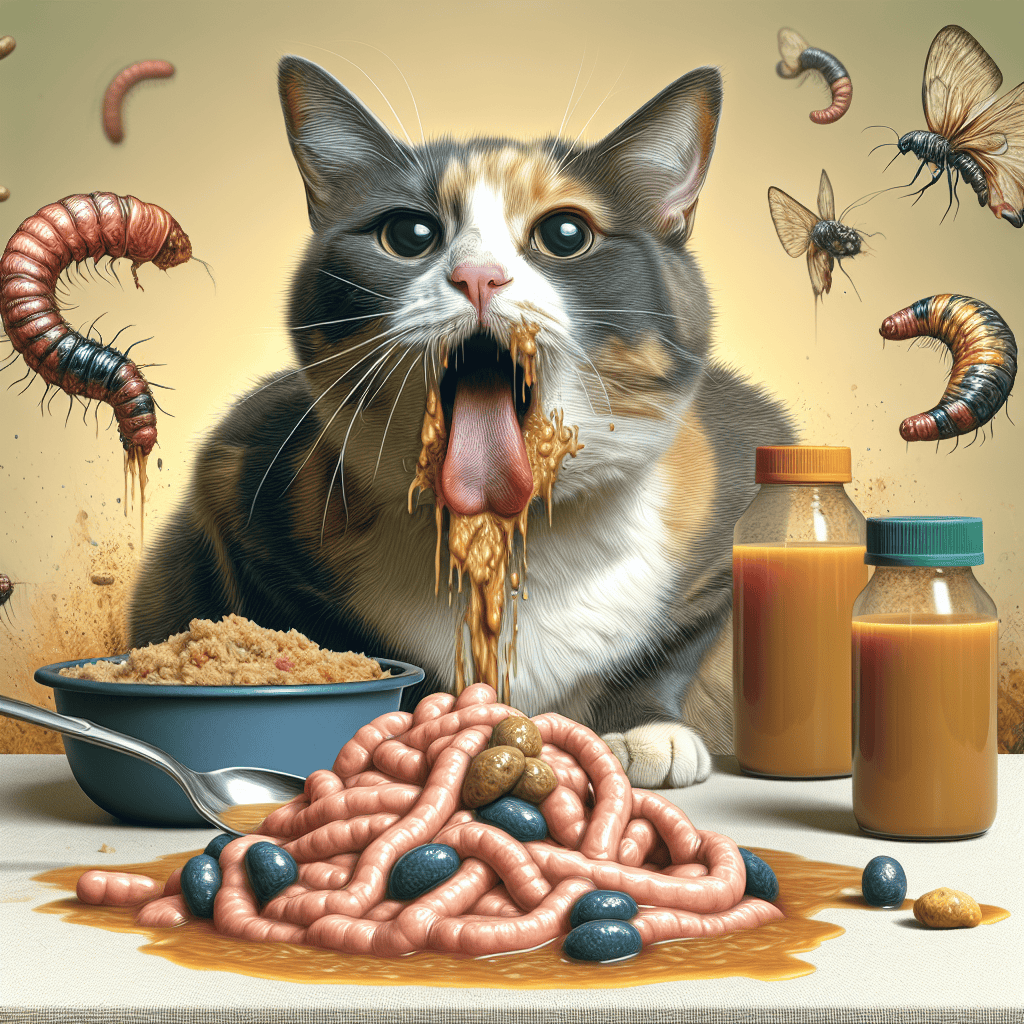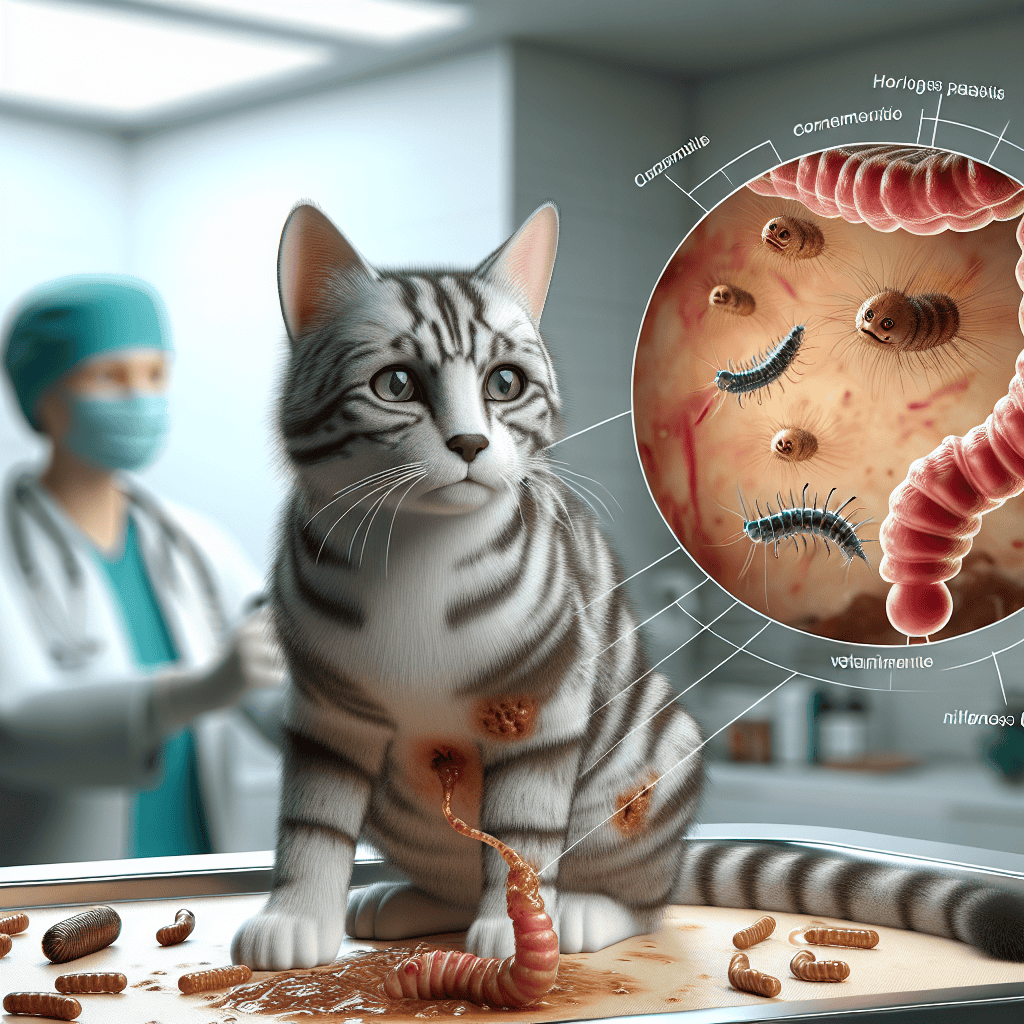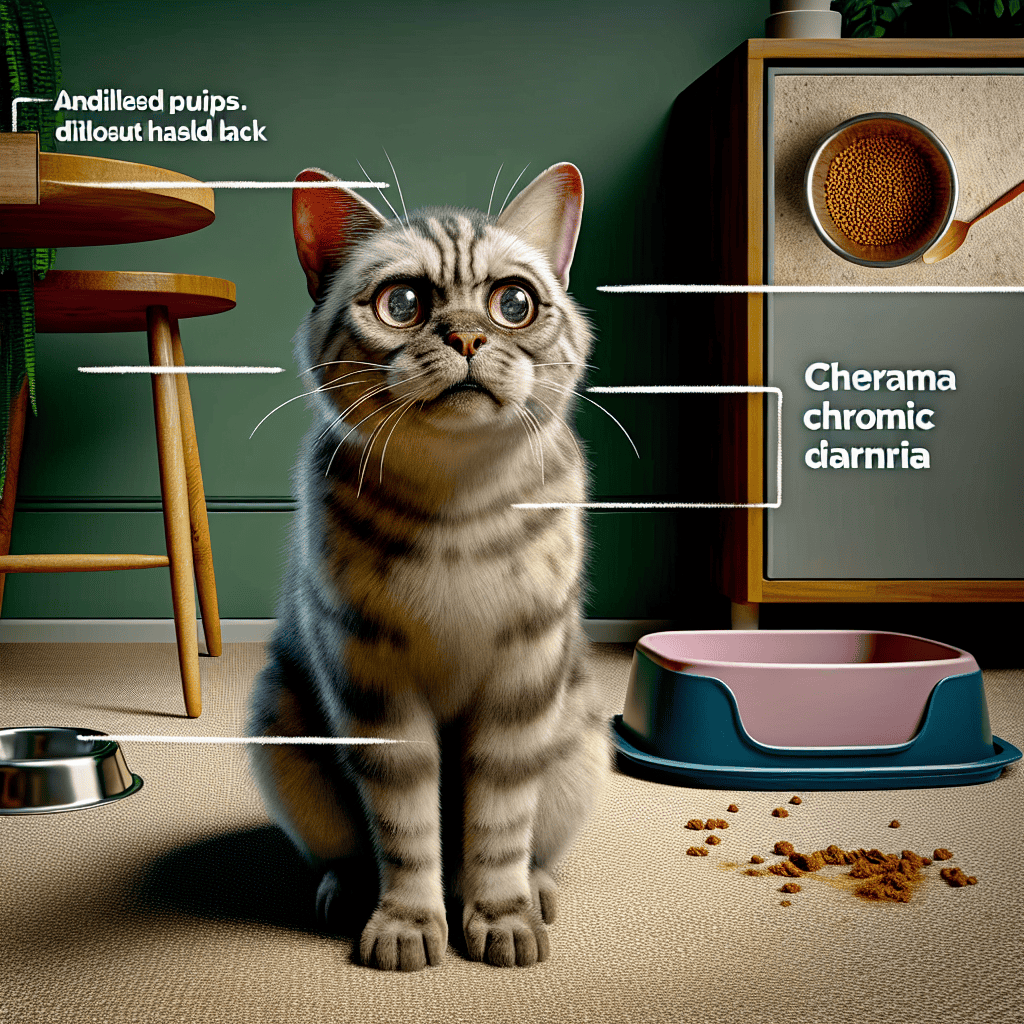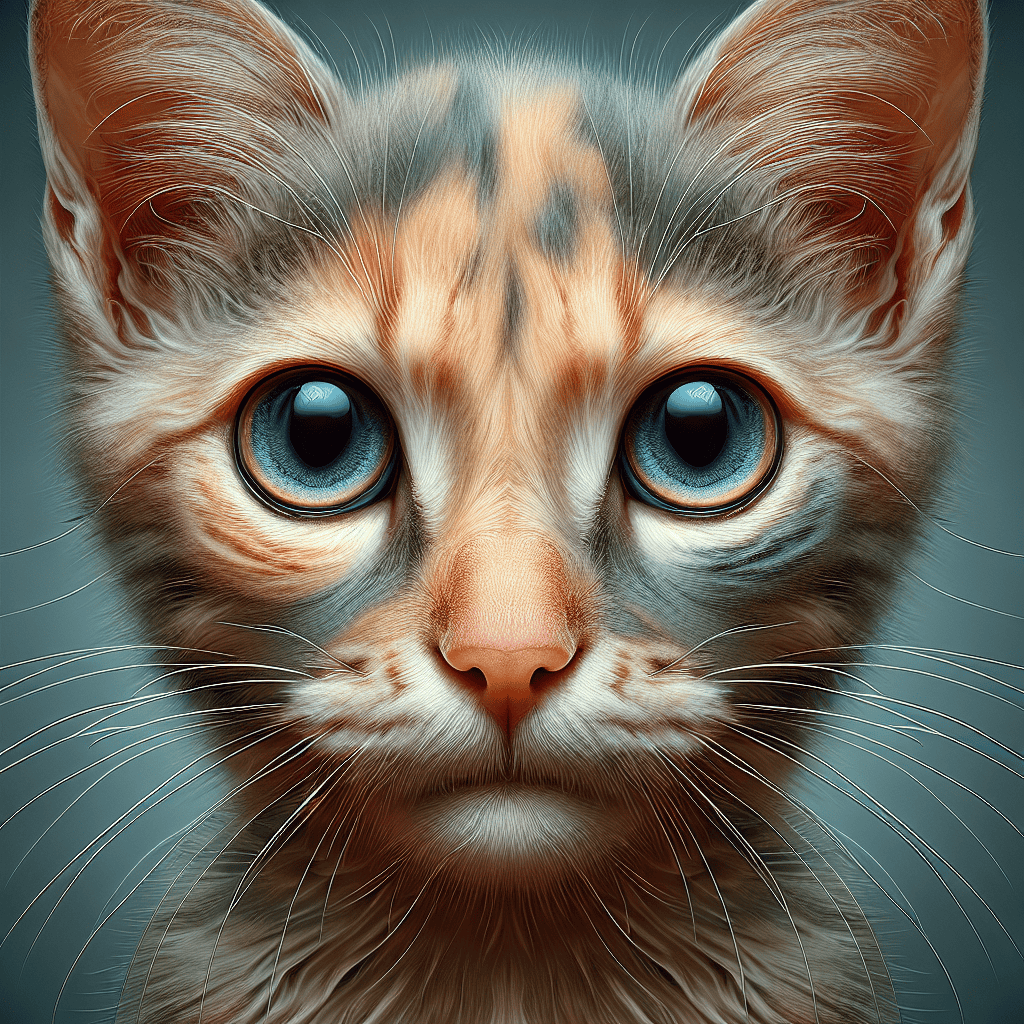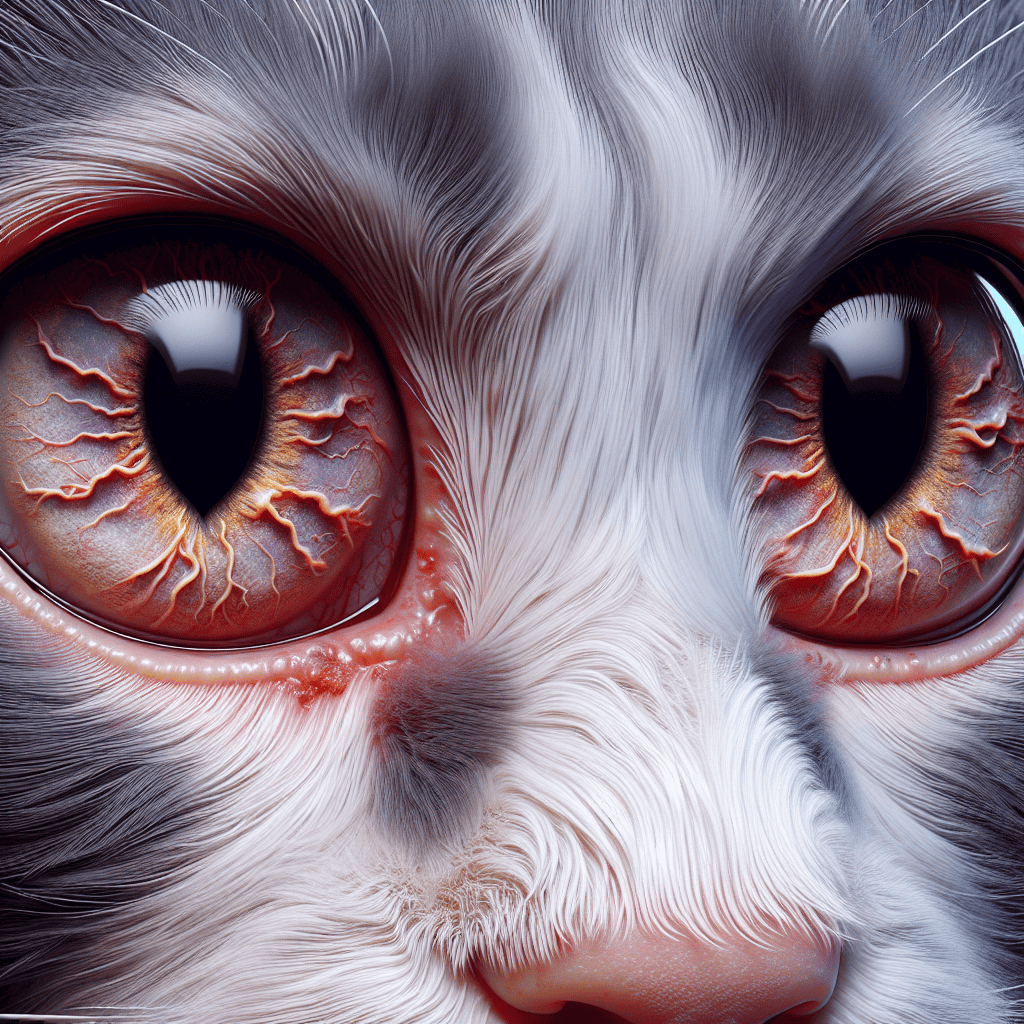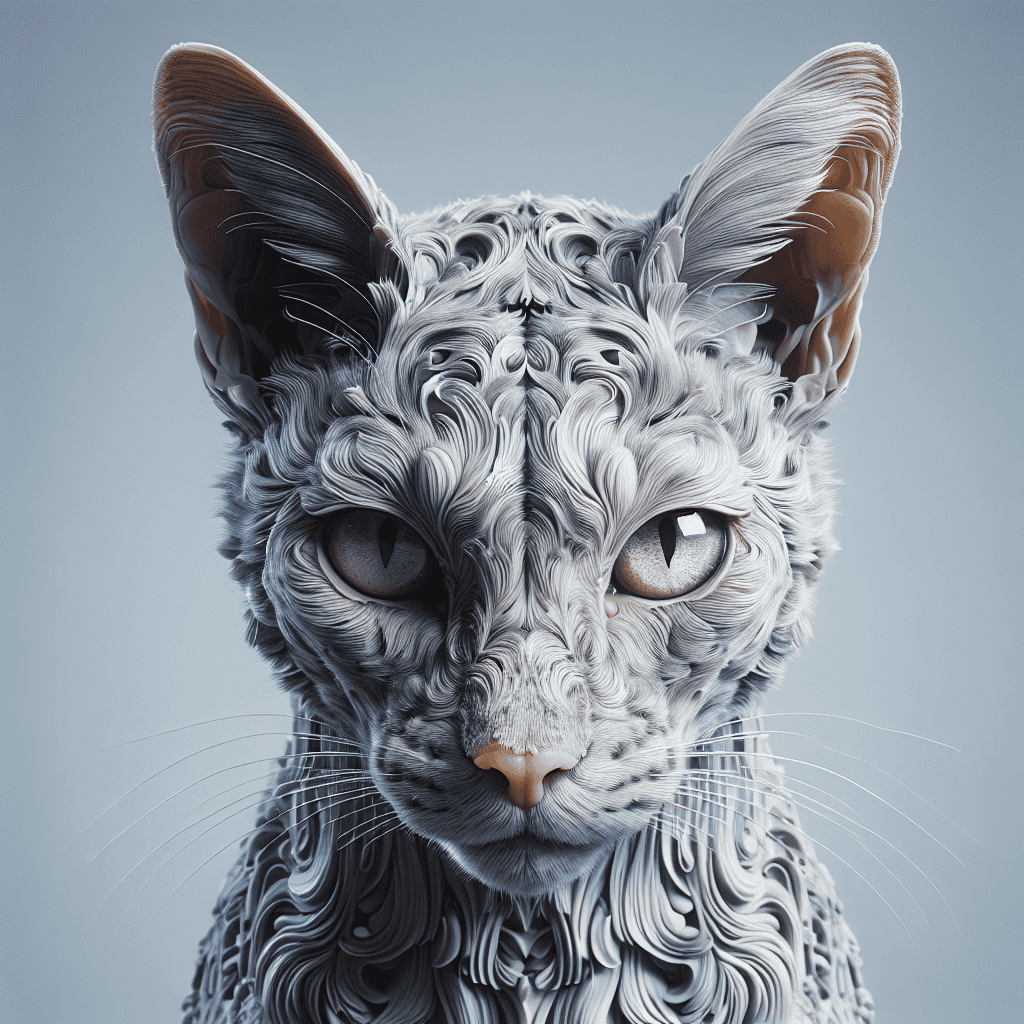Understanding Chronic Diarrhea in Cats
Chronic diarrhea in cats refers to stool that is consistently softer than normal and continues for several weeks or longer. This condition can affect cats of all breeds and ages, with kittens, senior cats, and immunocompromised cats being more susceptible to serious complications (PetMD).
Definition and Symptoms
Chronic diarrhea is characterized by persistent loose or watery feces that may vary in color and consistency. It is important to distinguish chronic diarrhea from occasional or acute episodes of diarrhea, which may be caused by temporary factors such as dietary indiscretion or a short-term gastrointestinal upset.
The symptoms of chronic diarrhea in cats may include:
- Frequent or increased frequency of bowel movements
- Loose or watery stool
- Straining or discomfort during defecation
- Presence of blood or mucus in the stool
- Weight loss
- Dehydration
- Lethargy or reduced activity levels
If you notice any of these symptoms in your cat, it is advisable to consult a veterinarian for a proper diagnosis and treatment plan.
Causes of Chronic Diarrhea
Chronic diarrhea in cats can have various underlying causes. Some common factors that can contribute to chronic diarrhea include:
- Diseases affecting the intestines or gastrointestinal system
- Inflammatory bowel disease
- Intestinal parasites
- Bacterial or viral infections
- Food allergies or intolerances
- Vitamin deficiencies
- Partial obstructions
- Abnormal digestion of food
- Hyperthyroidism
- Kidney disease
- Liver disease
- Diabetes
- Cancer
- Pancreatitis
It’s important to note that changes in diet, food intolerances, or allergies to specific ingredients can also cause diarrhea in cats (VCA Hospitals). However, changing the diet without proper guidance from a veterinarian can potentially worsen the condition. Therefore, it is recommended to consult a veterinarian before making any dietary changes.
By understanding the definition, symptoms, and potential causes of chronic diarrhea in cats, you can take the necessary steps to address this condition and provide the best possible care for your feline companion. In the next sections, we will explore the diagnostic process, treatment options, and special dietary considerations for managing chronic diarrhea in cats.
Diagnosing Chronic Diarrhea in Cats
When a cat experiences chronic diarrhea, it is essential to undergo a proper diagnostic process to identify the underlying cause. This section will explore the diagnostic tests and evaluation process commonly used by veterinarians.
Diagnostic Tests
To diagnose chronic diarrhea in cats, veterinarians may utilize a combination of diagnostic tests. These tests help to gather crucial information about the cat’s overall health and identify any underlying conditions that may be contributing to the diarrhea. Some of the tests that veterinarians may employ include:
- Complete blood count (CBC) and blood chemistry test: These tests provide insights into the cat’s organ function, hydration status, and overall health.
- Thyroid test: An overactive thyroid gland can cause diarrhea in cats, so this test helps rule out thyroid-related issues.
- Fecal test: This test examines the cat’s stool for the presence of parasites, such as worms, which can contribute to diarrhea.
- Urinalysis test: A urinalysis helps evaluate the cat’s kidney function and detect any signs of urinary tract infections.
- Infectious disease test: This test checks for infectious diseases, such as feline leukemia virus (FeLV) or feline immunodeficiency virus (FIV), which can cause diarrhea.
- Fecal PCR test: A polymerase chain reaction (PCR) test can identify the presence of specific bacteria or viruses in the cat’s stool.
- Absorption test: This test assesses the cat’s ability to absorb nutrients from food by measuring the levels of specific substances in the bloodstream.
- X-rays and abdominal ultrasound: These imaging techniques help evaluate the cat’s gastrointestinal tract for any abnormalities or obstructions.
- Endoscopy/colonoscopy: These procedures involve inserting a flexible tube with a camera into the cat’s digestive tract to visualize and obtain biopsies if necessary.
- Biopsies: Biopsies involve collecting small tissue samples from the gastrointestinal tract for further analysis.
Evaluation Process
In addition to the diagnostic tests, veterinarians conduct a thorough evaluation process to gather important information about the cat’s medical history and current symptoms. This evaluation may include:
- Detailed history: The veterinarian will ask questions about the cat’s diet, recent dietary changes, exposure to potential toxins, and any previous treatments.
- Physical examination: The veterinarian will perform a comprehensive physical examination, checking for signs of dehydration, abdominal pain, or other abnormalities.
- Dietary assessment: The veterinarian may inquire about the cat’s current diet, including the type of food, feeding schedule, and any recent changes in diet.
By combining the results of diagnostic tests with the information obtained during the evaluation process, veterinarians can establish a comprehensive understanding of the cat’s condition. This information is crucial in determining the most appropriate treatment plan to address the underlying cause of the chronic diarrhea.
If you suspect that your cat is experiencing chronic diarrhea, it is vital to consult a veterinarian. They will guide you through the diagnostic process and help identify the cause of the diarrhea. Remember, each cat is unique, and an accurate diagnosis is essential to provide the most effective treatment for your feline companion.
Treatment Options for Chronic Diarrhea
When it comes to managing chronic diarrhea in cats, there are several treatment options available. These options include dietary management, as well as the use of medication and supplements.
Dietary Management
Dietary management plays a crucial role in the treatment of chronic diarrhea in cats. In fact, studies have shown that a significant number of cats with chronic diarrhea showed improvement when dietary changes were implemented. According to a study published in PubMed, approximately 78.2% of cats experienced improvement in their fecal scores by at least 25 points on a 100-point scale or achieved a final fecal score of at least 66. Additionally, over one-third of the cats developed normal stools within a few weeks.
When selecting a diet for cats with chronic diarrhea, it is important to choose highly digestible options. Highly digestible diets have been shown to improve fecal scores in cats with chronic, nonspecific diarrhea. These diets should contain a single protein source, without allergenic additives or flavorings, and nutrients with protein digestibility greater than 87% and carbohydrate digestibility greater than 90% (dvm360). Depending on the underlying cause of the diarrhea, different types of diets may be recommended.
- For conditions such as pancreatitis, infections, mechanical obstructions, or thyroid disease, a low-fat/high-fiber diet may be recommended (PetMD).
- For immunocompromised cats, those with inflammatory bowel disease, triaditis, and vitamin deficiencies, a novel protein/hydrolyzed diet may be recommended (PetMD).
It is important to work closely with your veterinarian to determine the most appropriate diet for your cat’s specific needs.
Medication and Supplements
In addition to dietary management, medication and supplements may also be prescribed to help manage chronic diarrhea in cats. The specific medications or supplements recommended will depend on the underlying cause of the diarrhea.
- Cats with non-intestinal-related diseases, such as hyperthyroidism or diabetes, may require specific treatments for these conditions (PetMD).
- Cats with intestinal-related issues may benefit from digestive support medications and supplements. These can help improve digestion and reduce inflammation in the gastrointestinal tract.
It is important to note that the use of medication and supplements should always be done under the guidance of a veterinarian. They will be able to determine the most appropriate treatment plan based on the individual needs of your cat.
By implementing appropriate dietary management, along with the use of medication and supplements if necessary, it is possible to effectively manage chronic diarrhea in cats. It is important to work closely with your veterinarian to develop a comprehensive treatment plan that addresses the underlying cause of the diarrhea and promotes the overall health and well-being of your cat.
Importance of Proper Nutrition
When it comes to managing chronic diarrhea in cats, proper nutrition plays a crucial role. Providing your cat with a well-balanced diet that meets their nutritional needs is essential for their overall health and well-being. Let’s explore the importance of essential nutrients for cats and the role of diet in managing diarrhea.
Essential Nutrients for Cats
Cats are obligate carnivores, meaning they have specific dietary requirements that must be met for them to thrive. Protein is a vital nutrient for cats, as it provides the building blocks for essential functions in their bodies. Look for cat food that lists named protein sources, such as chicken or fish, as one of the first ingredients on the label. A minimum of 26% to 30% crude protein by dry matter is recommended for cats, especially for growth and reproduction.
Fats are another crucial nutrient for cats, providing them with concentrated energy. Omega-3 and Omega-6 fatty acids, found in animal-based fats, play important roles in overall health. Cat food should contain approximately 9% fat of dry matter to meet their dietary requirements.
While cats have no nutritional requirement for carbohydrates, some digestible carbohydrates can be utilized for energy. However, it’s important to ensure that cat food does not exceed 10% carbohydrate content on a dry matter basis to avoid potential health issues (BetterVet).
In addition to protein, fats, and carbohydrates, cats require a balanced intake of vitamins and minerals. These nutrients are essential for various bodily functions and maintaining optimal health. Many commercial cat foods are fortified with synthetic vitamins and minerals, but high-quality cat foods also incorporate natural ingredients that are naturally rich in these nutrients (BetterVet).
Role of Diet in Managing Diarrhea
Diet plays a significant role in managing chronic diarrhea in cats. The type of food you feed your cat can impact the frequency and consistency of their bowel movements. In cases of chronic diarrhea, it may be necessary to make dietary adjustments to help alleviate the symptoms.
Low-fat and high-fiber diets are often recommended for cats with chronic diarrhea. These diets can help regulate the digestive system, promote healthy bowel movements, and reduce the occurrence of loose stools. Additionally, novel protein or hydrolyzed diets may be recommended for cats with food sensitivities or allergies, as these diets contain unique protein sources that are less likely to trigger adverse reactions.
When selecting a diet for your cat with chronic diarrhea, it’s essential to consult with a veterinarian who can provide guidance based on your cat’s specific needs. They can help determine the underlying cause of the diarrhea and recommend an appropriate diet that supports your cat’s digestive health.
In conclusion, providing your cat with a nutritionally balanced diet that meets their specific needs is crucial for managing chronic diarrhea. Essential nutrients, such as protein, fats, carbohydrates, vitamins, and minerals, play vital roles in your cat’s overall health. By working closely with your veterinarian and selecting an appropriate diet, you can help alleviate your cat’s diarrhea symptoms and promote their well-being.
Special Dietary Considerations
When it comes to managing chronic diarrhea in cats, special dietary considerations play a crucial role in providing relief and promoting gastrointestinal health. Two common types of diets that are often recommended for cats with chronic diarrhea are low-fat/high-fiber diets and novel protein/hydrolyzed diets.
Low-Fat/High-Fiber Diets
Low-fat/high-fiber diets are often recommended for cats with chronic diarrhea caused by conditions such as pancreatitis, infections, mechanical obstructions, or thyroid disease. These diets are designed to provide a balance of nutrients while reducing fat content and increasing the fiber content in the cat’s diet.
The reduction in fat content helps to alleviate stress on the digestive system, as fat can be harder to digest for cats with chronic diarrhea. Meanwhile, the increased fiber content helps regulate bowel movements and promote healthy digestion. Fiber also helps to absorb excess water in the colon, resulting in firmer stools.
When selecting a low-fat/high-fiber diet for your cat, it’s important to ensure that it is highly digestible and contains a single protein source. According to a study published in PubMed, there were no significant differences in clinical responses between cats fed high-fat or low-fat, highly digestible diets for chronic diarrhea. Both types of diets showed improvement in fecal scores.
Novel Protein/Hydrolyzed Diets
For cats with chronic diarrhea resulting from conditions such as immunocompromised states, inflammatory bowel disease, triaditis, or vitamin deficiencies, novel protein/hydrolyzed diets are often recommended (PetMD). These diets utilize unique protein sources that the cat has not been previously exposed to, reducing the chance of triggering an allergic reaction or exacerbating existing gastrointestinal issues.
Novel protein diets typically contain proteins such as venison, rabbit, or duck, which are less commonly found in commercial cat foods. Hydrolyzed diets, on the other hand, involve breaking down proteins into smaller molecules, making them easier for cats to digest and reducing the likelihood of an adverse reaction.
These specialized diets aim to provide essential nutrients while minimizing the risk of triggering inflammation or allergies. By providing a nutritionally balanced diet that is gentle on the digestive system, novel protein/hydrolyzed diets can help manage the symptoms of chronic diarrhea in cats.
It’s important to note that the specific diet recommended for your cat with chronic diarrhea will depend on the underlying cause and the results of diagnostic tests. Consulting with a veterinarian is crucial for determining the most appropriate dietary approach for your cat’s individual needs.
By addressing chronic diarrhea through special dietary considerations, you can help alleviate your cat’s discomfort and support their gastrointestinal health. These diets, whether low-fat/high-fiber or novel protein/hydrolyzed, can play a significant role in managing chronic diarrhea and improving your cat’s overall well-being.
Supporting Cats with Chronic Diarrhea
Dealing with chronic diarrhea in cats can be challenging, but there are steps you can take to provide support and relief for your feline companion. In this section, we will explore two primary approaches: home remedies and consulting a veterinarian.
Home Remedies
While it is important to consult a veterinarian for a proper diagnosis and treatment plan, there are some home remedies that may provide temporary relief for cats with chronic diarrhea. However, it’s crucial to note that these remedies should not be viewed as a substitute for professional veterinary care.
- Temporary fasting: For otherwise healthy adult cats, withholding food for up to 24 hours may be advised. This gives the digestive system time to rest and recover. However, it’s essential to consult with a veterinarian before implementing fasting to ensure it is appropriate for your cat’s specific situation and health condition.
- Veterinary diet: Your veterinarian may recommend feeding small quantities of a veterinary diet formulated for gastrointestinal problems. These diets are formulated with a balance of fibers that support the growth of beneficial bacteria in the intestine and antioxidants that promote the immune system’s recovery.
It’s important to closely monitor your cat’s condition during any home remedy or dietary changes. If there is no improvement or if your cat’s condition worsens, it is crucial to seek veterinary advice promptly.
Consulting a Veterinarian
Chronic diarrhea in cats can have various underlying causes, including changes in diet, food intolerances or allergies, parasites, and stress (VCA Hospitals). To effectively address and manage your cat’s condition, it is essential to consult a veterinarian. They will be able to evaluate your cat’s symptoms, perform diagnostic tests, and recommend appropriate treatment options.
When consulting a veterinarian, they may suggest the following:
- Diagnostic tests: Your veterinarian may recommend diagnostic tests, such as fecal examinations, blood work, or imaging, to identify the underlying cause of the chronic diarrhea. These tests can help determine the most appropriate treatment plan for your cat.
- Medication and supplements: Depending on the specific diagnosis and severity of the diarrhea, your veterinarian may prescribe medications, such as anti-diarrheal agents or dewormers, to address the underlying cause. They may also recommend probiotics or other supplements to support your cat’s intestinal health.
Remember, severe or prolonged diarrhea can lead to dehydration and metabolic disturbances in cats. If your cat’s condition worsens or if they show signs of dehydration, such as lethargy, decreased appetite, or sunken eyes, immediate veterinary attention is necessary.
By combining home remedies with professional veterinary guidance, you can provide the best possible support for your cat with chronic diarrhea. The veterinarian will help determine the most appropriate treatment options based on your cat’s specific condition and needs.






